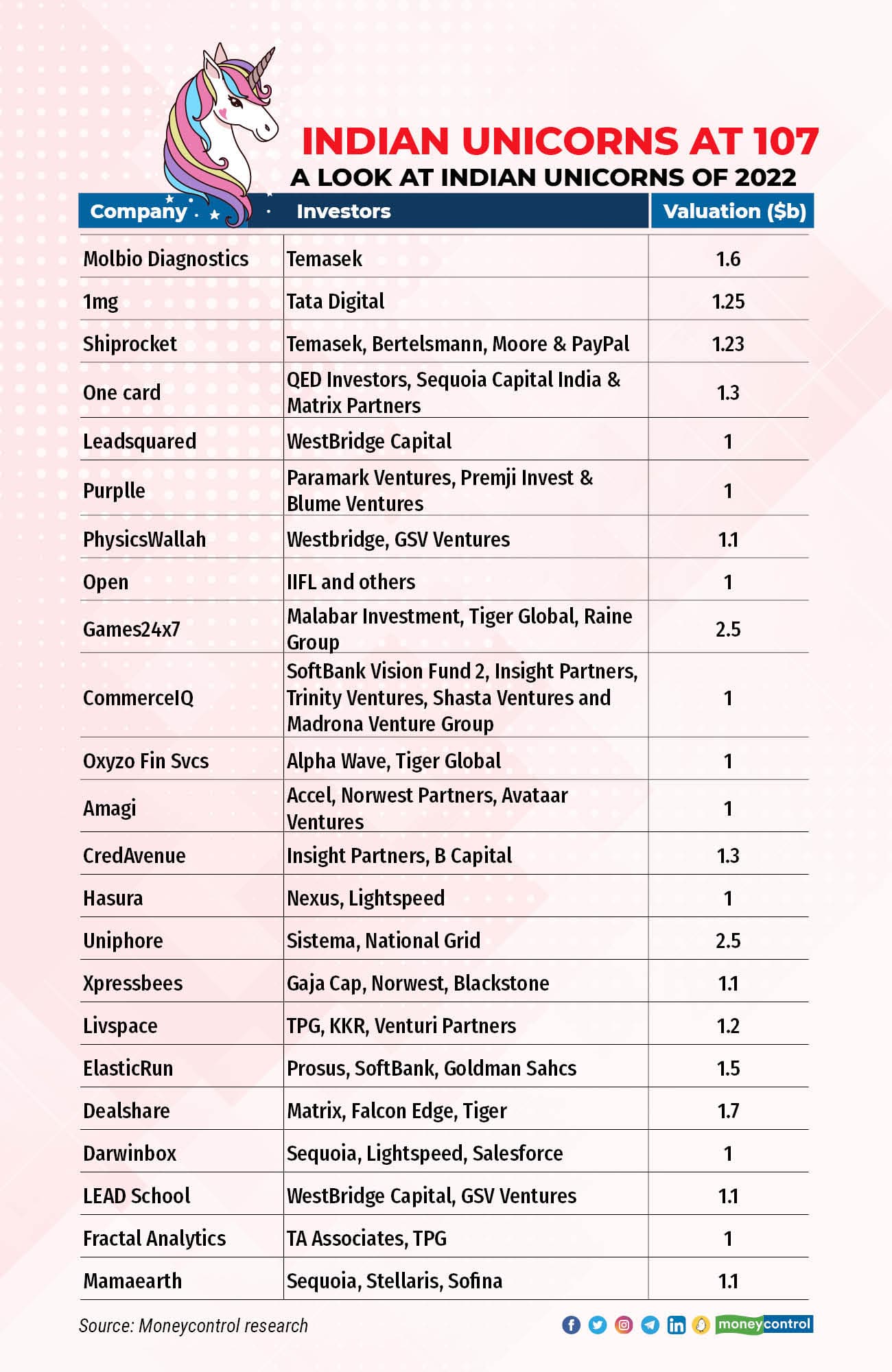



There is very little known about unicorns. So it's impossible to say whether these mythical creatures like or dislike winter. But their namesakes, or VC-funded startups valued at more than a billion dollars, despise winters.
These so-called unicorns vanished this year amid a cold investment wave in global financial markets, brought on by persistently high inflation, which compelled central banks around the world to raise interest rates.
The cold wave has lasted more than nine months and is expected to worsen in 2023, implying that there will be even fewer unicorns emerging next year after the number has already been cut in half this year.
Compared to last year's total of 542, only 244 new unicorns have been created globally so far in 2022, according to data compiled by private market intelligence platform Tracxn Technologies. Compared to 44 in 2021, only 23 new unicorns were minted in India this year, according to data compiled by Moneycontrol.

To be sure, the startup ecosystem's first three months of 2022 weren't all that bad. Like last year, India got a new unicorn almost every week. Up until March, India minted as many as 14 new unicorns.
However, the first month of India's new fiscal year—FY23 (2022-23)—was when the country's startup ecosystem first felt the funding winter chills. For the first time in nearly 19 months, or since August 2020, India did not see a new unicorn minted. Since then, the country has only seen nine new unicorns minted in the nine months to December, compared to 39 in the same period in 2021.
Unicorns in which sectors?Two of the country's 23 new unicorns, PhysicsWallah and LEAD, were edtech firms, while three were fintech firms. Fintech and edtech were two of the hottest sectors in 2021. In 2021, up to eight new unicorns were created in the fintech sector, while three edtech companies became unicorns. As of today, India has 17 fintech unicorns and seven edtech unicorns.
SaaS (software-as-a-service) was the hottest sector in 2022. Six new SaaS startups serving various industries became unicorns this year, compared to four in 2021 and one in 2020. India currently has 16 SaaS unicorns.
Apart from SaaS, logistics companies have seen investor interest. This year, three new logistics startups—XpressBees, Elastic Run, and ShipRocket—became unicorns, bringing the total number of logistics unicorns in India to seven. There was only one new logistics unicorn minted in 2021, and none in 2020.
While the agritech sector attracted significant investor interest throughout the year, India is yet to produce an agritech unicorn. DeHaat, an artificial intelligence agritech startup backed by Sequoia Capital that provides end-to-end farming solutions, was in talks to raise a new funding round at a unicorn valuation, but could only raise money at a valuation of approximately $700 million.
Slowdown in fundingThe decrease in the number of new unicorns minted this year highlighted how capital to the startup ecosystem has slowed. From April to December 2022, VC and PE (private equity) funding to India's startup ecosystem fell nearly 50% year on year to $29.2 billion. Between April and December 2021, PE/VC investors invested approximately $58.9 billion in the country's startup ecosystem, making it the world's third-largest.
The number of late-stage investments (Series C onwards), when unicorns typically get minted, has decreased significantly in 2022, as some of the nation's most active late-stage investors have scaled back their capital allocation. Moneycontrol reported earlier this month that SoftBank, a venture capital firm that has invested in 21 of the country's 107 unicorns, has reduced its investments by more than 80% this year compared to 2021.
According to Tracxn, compared to $43 billion in 2021, late-stage investments to India's startup ecosystem fell to just under $25 billion in 2022. However, it should be noted that three of India's largest funding rounds—VerSe Innovation ($805 million), the parent company of DailyHunt, Byju ($800 million), and Swiggy ($700 million)—took place in the first three months of the year. Late-stage PE/VC funding decreased from nearly $38 billion in 2021 to $14.9 billion in 2022, with the first three months of 2022 excluded.
With the funding winter expected to worsen in the coming year, many large VC firms around the world have warned startups to brace themselves for the worst. It will be interesting to see how many new unicorns are minted in India and around the world next year, as investors have revised their parameters to gauge the companies' valuations.
“There has been a shift in a lot of things. EBITDA (earnings before interest tax depreciation and amortisation) multiple has replaced revenue multiple, which was asked a lot last year. It might soon go to profit multiple for late-stage companies going forward,” said a veteran investor requesting anonymity.
Discover the latest Business News, Sensex, and Nifty updates. Obtain Personal Finance insights, tax queries, and expert opinions on Moneycontrol or download the Moneycontrol App to stay updated!
Find the best of Al News in one place, specially curated for you every weekend.
Stay on top of the latest tech trends and biggest startup news.